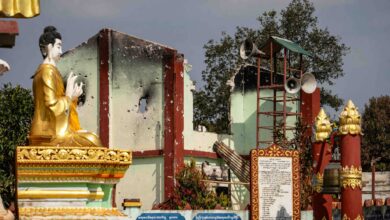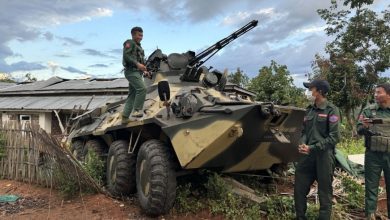
While Myanmar civilian leader Aung San Suu Kyi and President Win Myint serve decades-long jail sentences meted out in farcical court proceedings that followed a military coup in early 2021, their National League for Democracy (NLD)—the country’s largest and most popular party—is in disarray.
Hundreds of NLD officials have been incarcerated, some even tortured to death in military interrogation centres. The party’s headquarters in Yangon and its offices throughout the country have been repeatedly vandalised by individuals presumed to be affiliated with the military.
On Thursday, the military published a legal statute seen as a final blow to the party. The Political Parties Registration Law, enacted under the order of coup leader Min Aung Hlaing, requires all of Myanmar’s existing political parties to re-register with the military-appointed election commission within a period of 60 days. Those who fail to do so will be abolished, and the party’s assets confiscated.
The NLD’s leadership has already declared that they will not re-register with the junta’s electoral body, which is headed by a former military official who chaired the same commission under a previous dictator, Than Shwe.
However, even if the NLD chooses to re-register, it would likely make no difference: the junta law states that no political party may have as its members individuals who are serving jail terms or who are affiliated with entities designated by the military as “unlawful associations.”
Many NLD MPs elected in 2020 formed the parliamentary body known as Committee Representing the Pyidaungsu Hluttaw (CRPH), and others hold positions in the publicly mandated National Unity Government (NUG). Both have been declared as “terrorist groups” by the junta.
In order to comply with the coup regime’s party membership requirements, the NLD would need to declare that the party is in no way associated with the CRPH or the NUG, and dismiss Suu Kyi, Win Myint and many other jailed officials from its ranks.
It is not a new condition, and was once featured in an older party registration law enacted in 2010 under the rule of former military ruler Than Shwe.
At that time, Suu Kyi was under house arrest and the country was on the brink of a military-orchestrated transition to a “discipline-flourishing” democracy after decades of army rule. The NLD’s senior leadership opted not to dismiss Suu Kyi and other jailed party members and refused to re-register the party, resulting in an automatic boycott of the general election in the country.

It also led some of the top party leaders to leave and establish a breakaway group called the National Democratic Force (NDF). Two prominent NDF figures, Khin Maung Swe and Thein Nyunt, are now members of the junta.
This controversial clause in the party registration law was obviously designed to prevent the NLD from contesting the election in November 2010; the military-backed Union Solidarity and Development Party (USDP), led by former army generals, unsurprisingly declared a landslide victory.
After Suu Kyi was released from house arrest one week after the 2010 vote, ex-general Thein Sein—who had become the President in the USDP-led administration—removed the controversial requirement from the electoral law. The gesture followed a highly publicised meeting with Suu Kyi in August 2011—part of an effort to demonstrate to both domestic and international audiences that the country’s political transition was genuine and substantive.
The change in the law paved the way for Suu Kyi to re-register the NLD as a party and contest the parliamentary by-elections in 2012. It was a move for which she and the NLD faced objections from some senior colleagues and civil society organisations for seemingly legitimising a political system guided by the undemocratic and military-drafted 2008 Constitution.
Thursday’s newly-enacted law by Min Aung Hlaing restores the old clause that once kept the NLD at bay. It serves as a conclusion to an incident of historical rapprochement between the military establishment and the country’s main political opposition dating back more than a decade, and which formed the basis of Myanmar’s short-lived political liberalisation.
Speaking to the BBC’s Burmese language service, military council spokesperson Zaw Min Tun denied that the law was designed to persecute the NLD.
“We don’t have the intention of targeting any particular party,” he said. The fate of the NLD, he added, “is mainly in its own hands.”
NLD spokesperson Tun Myint, now in exile, explained that he remains positive about the future of the party, even when asked by Myanmar Now about the junta law that again disqualifies them from governing. He noted that the NLD had overcome several challenges since its establishment following the democratic uprising in 1988.
“Our party’s survival relies on public support. Since we will continue to reflect the will of the public, we have every confidence that we will survive,” he said.

One party rule
If the NLD is abolished, the USDP—headed by Khin Yi, a former police chief who recently served as the junta’s immigration minister—will be the dominant party in the country.
Myanmar Now previously reported that Khin Yi was assigned by Min Aung Hlaing to take on the party’s chairmanship role in order to quell internal tension between the junta chief and the USDP’s former leadership. The move was seen as a step toward ensuring that Min Aung Hlaing would be able to rely on the party to support his political ambitions.
In this increasingly restrictive context, ethnic political parties may also find themselves marginalised, barred from contesting the elections at a national level. A clause in the junta’s new law requires parties which intend to run in more than one state or region to enlist at least 100,000 members within 90 days of registering with the military-appointed election commission or face de-registration.
Opting to register as “regional parties” allows these entities to mobilise just 1,000 members, but then limits them to running in constituencies in one chosen state or region.
One of the largest and most prominent ethnic political parties, the Shan Nationalities League for Democracy (SNLD), has its largest support base in Shan State, but also traditionally contests in other areas with sizable ethnic Shan populations, such as Kachin State.
SNLD general secretary Sai Leik said that his party’s central executive committee members would need to convene a meeting in order to decide whether to re-register the party under the military council’s terms.
He pointed out that the junta’s electoral law would ensure that the Union parliament would be dominated by the USDP, as well as the military itself, which holds 25 percent of seats in all legislatures in accordance with the 2008 Constitution it drafted.
“The new law will merely intensify the competition between regional parties for a greater number of seats [in the state and regional parliaments], while our representation at the Union level will be seriously weakened,” Sai Leik said. “Only the military, the USDP and a few other parties backed by the military will remain significant in the Union parliament.”



